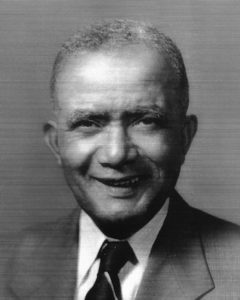
A. J. Smitherman
*A. J. Smitherman was born on this date in 1883. He was a Black newspaper administrator and businessman.
Andrew Jackson Smitherman was born in Childersburg, Alabama. Both of his parents were of mixed race (his grandparents were of white-European, African, and Native American heritage). Smitherman was the second eldest of 11 children. His father owned a coal mining business and a general store, managing 80 employees. When he was a small boy, his family relocated to the Muskogee part of the Creek Territory (known as the home of the “Upper Creeks”). Muskogee was not officially incorporated as a town until 1898. During their time in Muskogee, his father continued working in the coal mining business. His mother worked as a schoolteacher.
As a young man, Smitherman joined his father in the coal mine in Lehigh, Oklahoma. The work was difficult and dangerous, and his mother did not want him to follow in his father’s footsteps and insisted he get an education. Smitherman was accepted into Kansas University, which began accepting Black students as early as 1876. Smitherman studied at Northwestern University, LaSalle University’s extension in Chicago, and then received his law degree at LaSalle’s main campus in Boston.
He returned to Oklahoma in 1908 to work as a legal clerk for William H. Twine, an attorney who owned a small weekly newspaper called the Muskogee Cimeter. For three years, Smitherman worked as a law clerk and a journalist. During this time, the Black newspaper industry was a tiny grassroots movement.
Staff at these newspapers were often no more than one or two people, and newspaper publishers had to rely almost exclusively on subscriptions to maintain their businesses. In 1911, he started his newspaper, the Muskogee Star, and in 1913, he moved to Tulsa and launched the Daily Tulsa Star. Smitherman edited and published the paper at his plant until June 1, 1921, when the Tulsa Race Riot took place.
In its un-redeemed aftermath, each day brought a fresh liability in Tulsa. By 1925, Smitherman and his family relocated to Buffalo, N.Y., where he embarked on a newspaper journey again, establishing 1932 the Buffalo/Empire Star. He continued his work as a Black political leader in this capacity, and his journalistic integrity remained unimpeachable.
For the next four decades, with an unwavering conviction consistent with his demeanor, Smitherman provided a platform for his people where they could raise their voices against the evils of the day. A. J. Smitherman died in Buffalo in 1961.